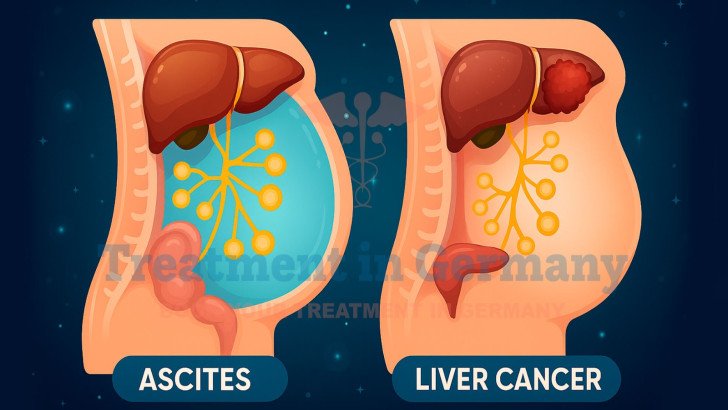
Ascites in liver cancer often reflects advanced disease. German healthcare centers use CT, MRI, and fluid analysis to guide staging and support international patients.
Ascites, the abnormal buildup of fluid in the abdominal cavity, is a common yet serious clinical finding in individuals with chronic liver disease. In oncology, particularly in patients with liver tumors, ascites often signals disease progression and impaired liver function. Its presence may not only indicate complications but also affect the overall staging of the cancer, influencing diagnostic and therapeutic decisions.
For international patients seeking thorough evaluation and high-quality care, German healthcare centers provide structured diagnostic pathways supported by advanced imaging modalities, including CT scans, MRI, Ultrasound and PET scans. With guidance from highly experienced German specialists, these centers offer accurate assessments and long-term care strategies. Services are coordinated through TIG (Treatment in Germany) www.treatmentingermany.de provides seamless coordination and complete logistic support, including travel, lodging, and visa arrangements (if needed).
Ascites is defined as the accumulation of free fluid in the peritoneal cavity, which surrounds abdominal organs. In liver diseases, ascites is typically due to portal hypertension, a condition where blood flow through the liver is obstructed, often by fibrosis, cirrhosis, or tumor invasion. This leads to increased pressure in the portal venous system and the leakage of fluid into the abdominal cavity.
In patients with advance liver cancer, ascites may also result from peritoneal metastasis, lymphatic obstruction, or direct tumor-related inflammation. The type of fluid, transudate or exudate, can give clues about the underlying cause. Malignant ascites, which contains cancer cells, often reflects advanced or metastatic disease.
In liver cancer, ascites typically develops through one or more of the following mechanisms:
When fluid accumulation occurs in this context, it often indicates significant disease burden and may complicate management. At German healthcare centers, such cases are handled by multidisciplinary teams that assess all contributing factors before offering guidance.
Symptoms and Clinical Presentation
The presentation of ascites in liver cancer varies based on the volume of fluid and disease progression. Common symptoms include:
These symptoms often prompt medical attention, particularly in patients with known liver tumors. Clinical assessment in Germany includes both physical examination and detailed imaging to understand the extent and cause of the fluid accumulation.
Diagnostic Imaging and Fluid Evaluation
In Germany, the evaluation of ascites is systematic and multidisciplinary. Investigations typically include:
In addition to imaging, diagnostic paracentesis is performed under ultrasound guidance. This involves withdrawing ascitic fluid for laboratory testing. Analysis includes:
These tests help distinguish malignant ascites from fluid due to other causes like cirrhosis or infection. In German healthcare centers, these assessments are typically completed within coordinated diagnostic sessions to minimize delays.
The Role of Ascites in Cancer Staging
The discovery of ascites in a patient with liver cancer can significantly affect cancer staging. In many cancer staging systems, the presence of malignant ascites signifies stage IV liver cancer, particularly if associated with peritoneal spread. Even non-malignant ascites, when combined with other findings, may imply poor liver function and advanced disease.
Staging plays a crucial role in decision-making, including options for systemic therapy or palliative care. Accurate staging requires a combination of clinical findings, imaging results, and laboratory data. In Germany, staging is performed by interdisciplinary tumor boards to ensure consistency and optimal care planning.
Monitoring and Evaluation in Germany for International Patients
For international patients, Germany offers highly coordinated care, starting from initial consultation to ongoing evaluation. This includes:
All these services are delivered under personalized treatment plans, tailored to each patient’s medical background and clinical goals. TIG (Treatment in Germany) assists patients in organizing travel, medical consultations, and translation of medical records, ensuring that the logistical process does not interfere with health decisions.
Prognostic Implications of Ascites in Liver Cancer
The development of ascites in the context of liver tumors often suggests a more guarded prognosis. Its presence reflects a disruption in vascular, hepatic, and sometimes lymphatic systems. While not always malignant, ascites correlates with reduced liver reserve, impaired immunity, and potential metastasis. In these patients, management goals shift toward maintaining quality of life and symptom control.
Nonetheless, timely diagnosis and accurate staging can improve clinical outcomes and help in planning appropriate supportive care. Germany’s reputation for thorough, individualized evaluation continues to attract patients who need diagnostic clarity and structured care pathways.
🌍Why Patients Worldwide Prefer Our Medical Services in Germany – Key Benefits Explained:
Frequently Asked Questions (FAQs)
1. What is ascites and how is it related to liver cancer?
Ascites is fluid buildup in the abdomen. In liver cancer, it often indicates vascular obstruction, impaired liver function, or metastatic spread.
2. Does ascites always mean cancer has spread?
Not necessarily. Ascites may result from cirrhosis or vascular compression, but malignant ascites suggests peritoneal involvement and advanced disease.
3. What imaging is used to detect ascites in Germany?
CT scans, MRI, and sometimes PET scans are used to detect fluid, liver lesions, and assess disease spread.
4. What is the role of paracentesis in diagnosis?
It allows for direct sampling of ascitic fluid, which is analyzed for cancer cells, infection, and protein content.
5. Can international patients undergo diagnostics in Germany?
Yes. International patients receive full diagnostic and logistical support through TIG (Treatment in Germany) www.treatmentingermany.de provides seamless coordination and complete logistic services.
6. How does ascites affect cancer staging?
The presence of ascites, especially when malignant, often upstages the disease to advanced levels and influences care decisions.
7. What specialists evaluate ascites in Germany?
German specialists in hepatology, radiology, and oncology collaborate to interpret findings and plan care.
8. Are follow-ups included in personalized plans?
Yes. Personalized treatment plans in Germany include regular imaging, lab monitoring, and symptom assessments.
Kindly complete the form below, and our dedicated team will reach out to you promptly. We look forward to connecting with you soon!
Trierer Straße, 56072 Koblenz, Germany

.webp)
 (1).webp)

.webp)
 (1).webp)


.webp)
 (1).webp)

.webp)
 (1).webp)
